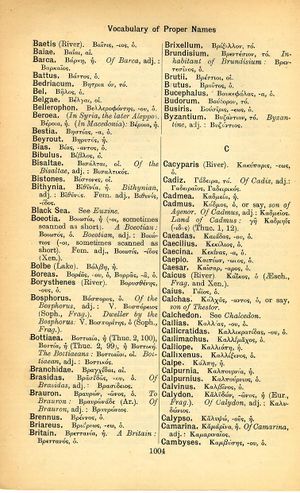Calpe
αἰὼν παῖς ἐστι παίζων, πεσσεύων∙ παιδός η βασιληίη → time is a child playing draughts; the kingship is a child's | a life-time is a child playing, playing checkers: the kingship belongs to a child | a whole human life-time is nothing but a child playing, playing checkers: the kingship belongs to a child | lifetime is a child at play, moving pieces in a game; kingship belongs to the child
English > Greek (Woodhouse)
Κάλπη, ἡ.
Latin > English (Lewis & Short)
Calpē: ēs, f., = Κάλπη,
I one of the pillars of Hercules in Hispania Baetica, now Rock of Gibraltar, Mel. 1, 5, 3; 2, 6, 8; Plin. 3, prooem. § 4; 3, 1, 3, § 7; Asin. ap. Cic. Fam. 10, 32, 1: Ibera, Sen. Herc. Oet. 1254; Luc. 1, 555; 4, 71 (abl. scanned Calpĕ, Juv. 14, 279).—
II Derivv.
A Calpētā-nus, a, um, adj., of Calpe: gurges, Avien. Progn. 1620.—
B Calpētĭtānus, a, um, adj., of Calpe: vada, Avien. Arat. 1023.
Latin > French (Gaffiot 2016)
Calpē,¹⁴ ēs, f. (Κάλπη), montagne de Bétique (auj. Gibraltar) : Pollio d. Cic. Fam. 10, 32, 1 ; Mela 1, 27 || Calpis, is, f., Sid. Ep. 8, 12, 2 ; abl. ĕ Juv. 14, 279.
Latin > German (Georges)
Calpē, ēs, f. (Κάλπη), hoher Berg an der gaditanischen Meerenge, der mit dem an der afrikan. Küste liegenden Vorgebirge Abyla die sogen. Säulen des Herkules bildet, j. Gibraltar, Asin. Poll. in Cic. ep. 10, 32, 1. Lucan. 1, 555; 4, 71: C. Hibera, Sen. Herc. Oet. 1257 (1253): Abl. unregelm. Calpĕ gemessen bei Iuven. 14, 279 (vgl. Prisc. 7, 8). – Dav. Calpētānus, a, um, kalpetanisch, Avien. progn. 296 (1621) u. Arat. 1024.

